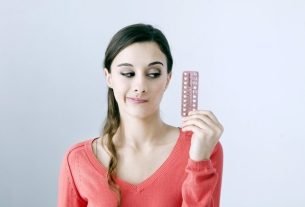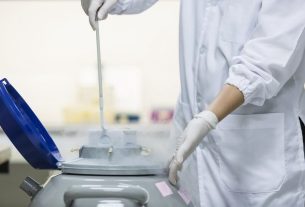Some medicines to induce ovulation, such as clomiphene, alphachoriogonadotropin or urofollitropin, act by regulating hormones in the body, which helps to stimulate the development of ovarian follicles and the maturation and release of eggs.
These remedies can be used in the form of tablets or injections, for the treatment of infertility, in cases of absence of spontaneous ovulation or irregular ovulation, as occurs in polycystic ovary syndrome, for example.
Ovulation-inducing medications must be used under medical advice, some of which are part of assisted reproduction programs, and therefore, a human reproduction doctor must be consulted.

9 ovulation-inducing remedies
The main ovulation-inducing medications are:
1. Clomiphene
Clomiphene is a medicine to induce ovulation in women who are unable to ovulate as it works by stimulating the pituitary gland in the brain to produce more LH and FSH, which in turn stimulate the ovaries to mature and release eggs.
This medicine is available in the form of 50 mg tablets, called Clomid, Indux or Serophene, for example, and should be used under the advice of a gynecologist. Find out how to take clomiphene.
2. Alfachoriogonadotropin
Alphachoriogonadotropin is a type of recombinant human chorionic gonadotropin (r-HCG) that has an action similar to the luteinizing hormone (LH) produced naturally by the body.
This remedy is indicated for women who do not ovulate or have irregular ovulation, or in cases of women who have undergone superovulation using assisted reproduction techniques. Check out the main assisted reproduction techniques.
This is because alphachoriogonadotropin stimulates the production of estrogen and progesterone, improving the function of the ovaries, and maturation and stimulating the release of eggs.
Alphachoriogonadotropin is used in the form of injectable pens for application under the skin, and is found under the name Ovidrel or Pregnyl.
3. Alfafolitropina
Folitropin alfa is also a type of recombinant human chorionic gonadotropin (r-HCG) indicated to induce ovulation in women who do not ovulate, which includes polycystic ovary syndrome, and who have not responded to treatment with clomiphene.
Furthermore, this hormone is also indicated to stimulate the development of multiple follicles in women who have undergone superovulation using assisted reproduction techniques.
Follitropin alfa can be found under the name Gonal-F, and must be applied subcutaneously, that is, under the skin, in doses recommended by the gynecologist.
4. Alfacorifolitropina
Corifollitropin alfa is a follicular stimulant that has a similar action to the luteinizing hormone (LH) naturally produced by the body.
This remedy is indicated for controlled ovarian stimulation in women undergoing infertility treatment with assisted reproduction techniques.
Corifollitropin alfa can be found under the trade name Elonva, in the form of an injection to be applied under the skin, as per medical advice.
5. Urofolitropina
Urofollitropin is a type of follicle-stimulating hormone (FSH), which stimulates follicular growth and ovulation.
This remedy is indicated in cases of women who have insufficient follicular maturation and lack of spontaneous ovulation, or in cases where the maturation of a follicle is desirable for natural fertilization.
Furthermore, urofollitropin can also be used for the development of multiple follicles in assisted reproductive techniques.
Urofollitropin can be found under the name Fostimon-M, in the form of an injectable lyophilic powder, which must be diluted in sterile saline solution before use, and applied by a doctor or nurse under the skin.
6. Deltafolitropina
Deltafolitropin is a gonadotropin indicated to stimulate the ovaries in a controlled way to develop multiple follicles in women undergoing treatment with assisted reproduction techniques.
This medicine is found under the name Rekovelle for application through injection under the skin, as per medical advice.
7. Menotropin
Menotropin is a medicine indicated for the treatment of infertility in women with ovarian failure, including polycystic ovary syndrome, when treatment with clomiphene has not been effective.
This medicine works by stimulating the growth of multiple follicles in assisted reproduction programs, such as in vitro fertilization or intracytoplasmic sperm injection.
Menotropin must be applied to the muscle or under the skin, by a nurse or doctor, it is found under the name Menopur.
8. Metformin
Metformin is an antidiabetic medicine that, although it does not directly induce ovulation, helps reduce insulin resistance, which is very common in women with polycystic ovaries and which can result in infertility.
Therefore, metformin, when treating polycystic ovary syndrome, can improve the chances of ovulation. Find out how to take metformin.
9. Bromocriptine
Bromocriptine is indicated for the treatment of hyperprolactinemia, which is a condition in which there is increased production of the hormone prolactin by the pituitary gland in the brain, which can make ovulation difficult and cause female infertility.
This medicine can be found in the form of 2.5 mg tablets, called Parlodel, and must be used under medical advice.
Possible side effects
The most common side effects of ovulation-inducing medications are:
- Hot flashes and redness in the face;
- Headache;
- Nausea or vomiting;
- Visual changes, such as greater sensitivity to light, or seeing flashes of light;
- Breast pain;
- Bleeding outside the menstrual period or heavy menstrual bleeding;
- Abdominal discomfort;
- Reactions at the injection site, in the case of injectable medicines.
In addition, fluid retention, multiple pregnancies and cyst formation may occur.
Another side effect that may arise with the use of injectable medicines to induce ovulation is ovarian hyperstimulation syndrome, which, although rare, can cause symptoms such as pain and swelling in the ovaries and/or abdomen, nausea, vomiting and diarrhea.
Home remedies to induce ovulation
Some home remedies that can help induce ovulation are agnocasto tea or ashwagandha tea, for example, as they can help regulate hormonal production, facilitating ovulation and the production of mature eggs. Find out how to prepare home remedies to get pregnant.
However, it is important to emphasize that home remedies do not replace treatment recommended by a doctor.

Sign up for our newsletter and stay up to date with exclusive news
that can transform your routine!
Warning: Undefined array key "title" in /home/storelat/public_html/wp-content/plugins/link-whisper-premium/templates/frontend/related-posts.php on line 12
Warning: Undefined array key "title_tag" in /home/storelat/public_html/wp-content/plugins/link-whisper-premium/templates/frontend/related-posts.php on line 13



